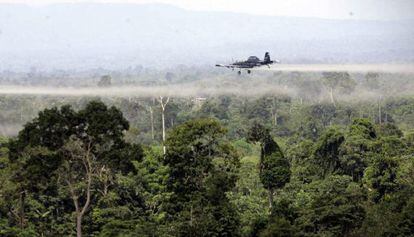Colombia changes course in drug war
Country to eliminate glyphosate fumigation, its main weapon against coca production

On Thursday, the National Narcotics Council (CNE), a body made up of ministers and other civil servants, decided to end glyphosate fumigation of coca crops in Colombia. The decision, which came after four hours of talks, has the support of President Juan Manuel Santos, though Inspector General Alejandro Ordóñez has taken a stand against this change in policy.
According to Justice Minister Yesid Reyes, the measure will come into force when the country’s environmental regulator, the ANLA, “revokes or suspends” the policy that allows the spraying of this herbicide. A technical committee will be created to deliver the necessary recommendations to “adjust anti-drug policy to the reality that this suspension means” in a month.
Spraying glyphosate became untenable after a WHO report said the chemical can cause cancer in humans
The decision did not come as a surprise. On Saturday, Santos said he wanted to end glyphosate fumigations and he asked members of the CNE to push for the measure at Thursday’s meeting. The president also spoke of a transition period to implement other mechanisms, such as manual eradication to replace spraying, thus continuing the fight against coca production, which represents just one link in the drug trafficking chain. The fight will also include increasing operations to destroy processing laboratories and shipments.
Spraying glyphosate became untenable after a World Health Organization (WHO) report published in April said the chemical can cause cancer in humans. Colombia has sprayed 1,800,000 hectares of coca plantations with glyphosate over the last 14 years. The method was backed by the United States through an initiative known as Plan Colombia and it was the country’s chief strategy against illegal coca production.
In 2014, the Constitutional Court of Colombia ordered the Health Ministry and the Environment Ministry to stop spraying glyphosate if evidence showed that it presented a health risk. Many residents in areas sprayed have reported skin problems and miscarriages.
After the WHO published its report, Justice Minister Yesid Reyes, Attorney General Eduardo Montealegre and President Santos joined Health Minister Alejandro Gaviria in his department’s recommendation to stop fumigation. But the final decision needed to come from ANLA.
United States ambassador to Colombia Kevin Whitaker wrote a column in El Tiempo newspaper saying that they had been able to slash coca production thanks to aerial spraying. “It is the most effective and safe method to eliminate coca,” he wrote. Glyphosate has been proven to be safe and to say the contrary is “to be misinformed,” Whitaker continued. But the United States would respect Colombia’s final decision on the issue, he said.
Some opposition members, such as Inspector General Ordóñez, have spoken out against CNE’s decision. Ordóñez has predicted that, without aerial spraying, the country will be “swimming in coca” in a few months. Ex-president Álvaro Uribe’s Democratic Center Party said the fight against drugs has eased off over recent months.
But Colombia’s Drug Policy Commission, a council of experts created by Santos two years ago, published a report on Wednesday saying that aerial spraying is ineffective. “To eliminate one hectare of coca by aerial spraying, about 30 hectares must be fumigated,” which means investing $72,000 per hectare. “From a cost-benefit perspective, this policy is very inefficient given that one hectare of coca is worth $400 and the cocaine that it may yield is worth about $3,600.”
Some opposition members have spoken out against CNE’s decision, saying the country will be “swimming in coca”
Nineteen Democratic lawmakers from the United States Congress have also said they support the suspension of glyphosate fumigation in Colombia. They sent an open letter to Santos asking him to implement the measure swiftly and to “ground all fumigation planes.”
The National Narcotics Council decided on this measure even though the Ministry of Defense – using data published by the United Nations – warns that coca production grew by 15 to 20 percent last year. The White House’s own records say production rose by 39 percent. The challenge for Colombia now is to check the spread of coca plantations without glyphosate.
The use of this herbicide is already illegal in natural parks and in some parts of the border with Ecuador.










































